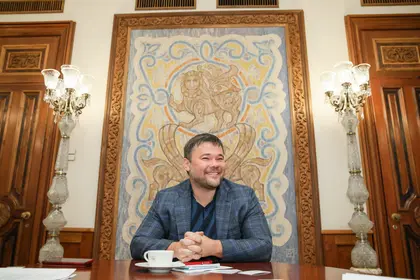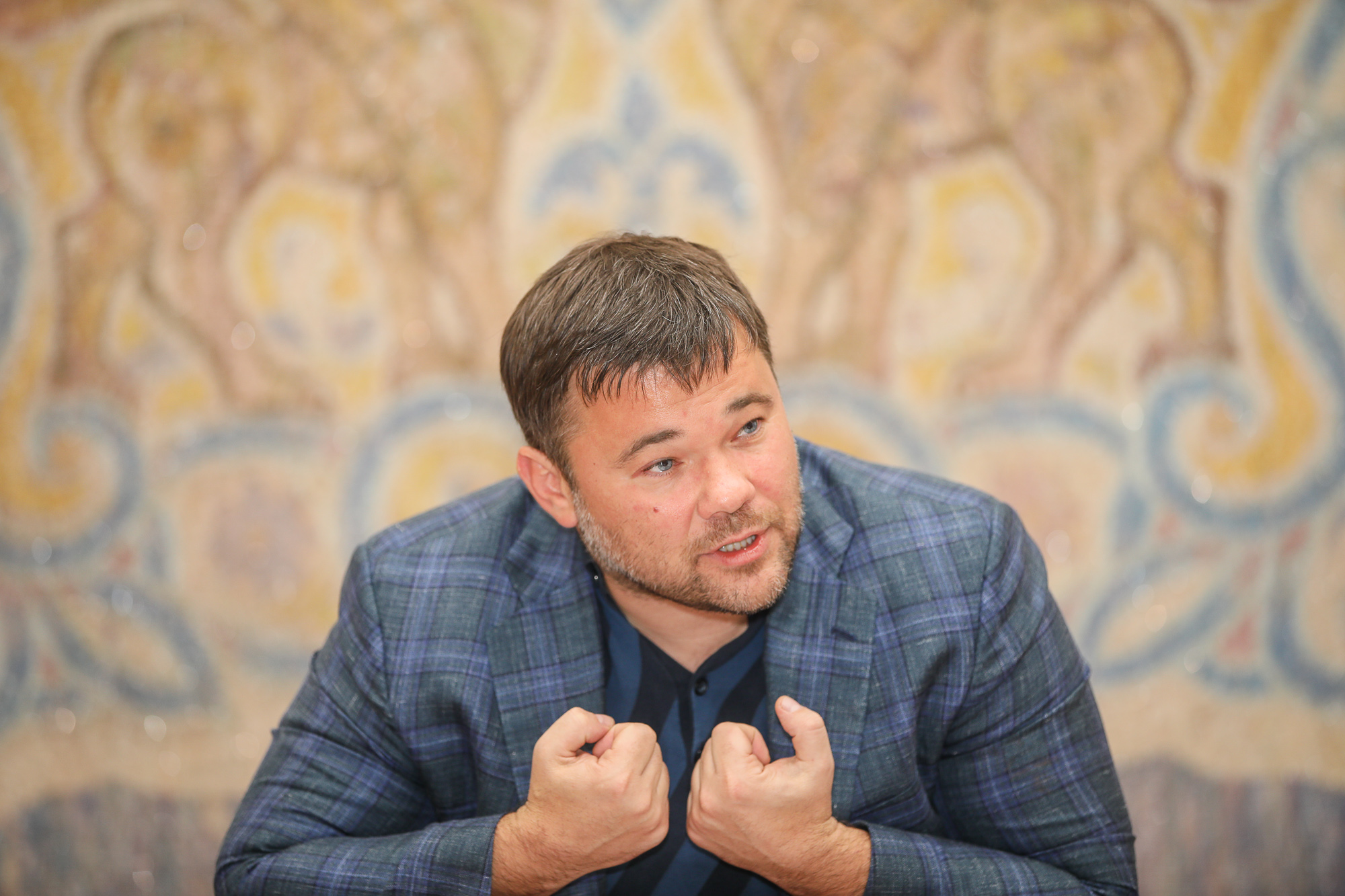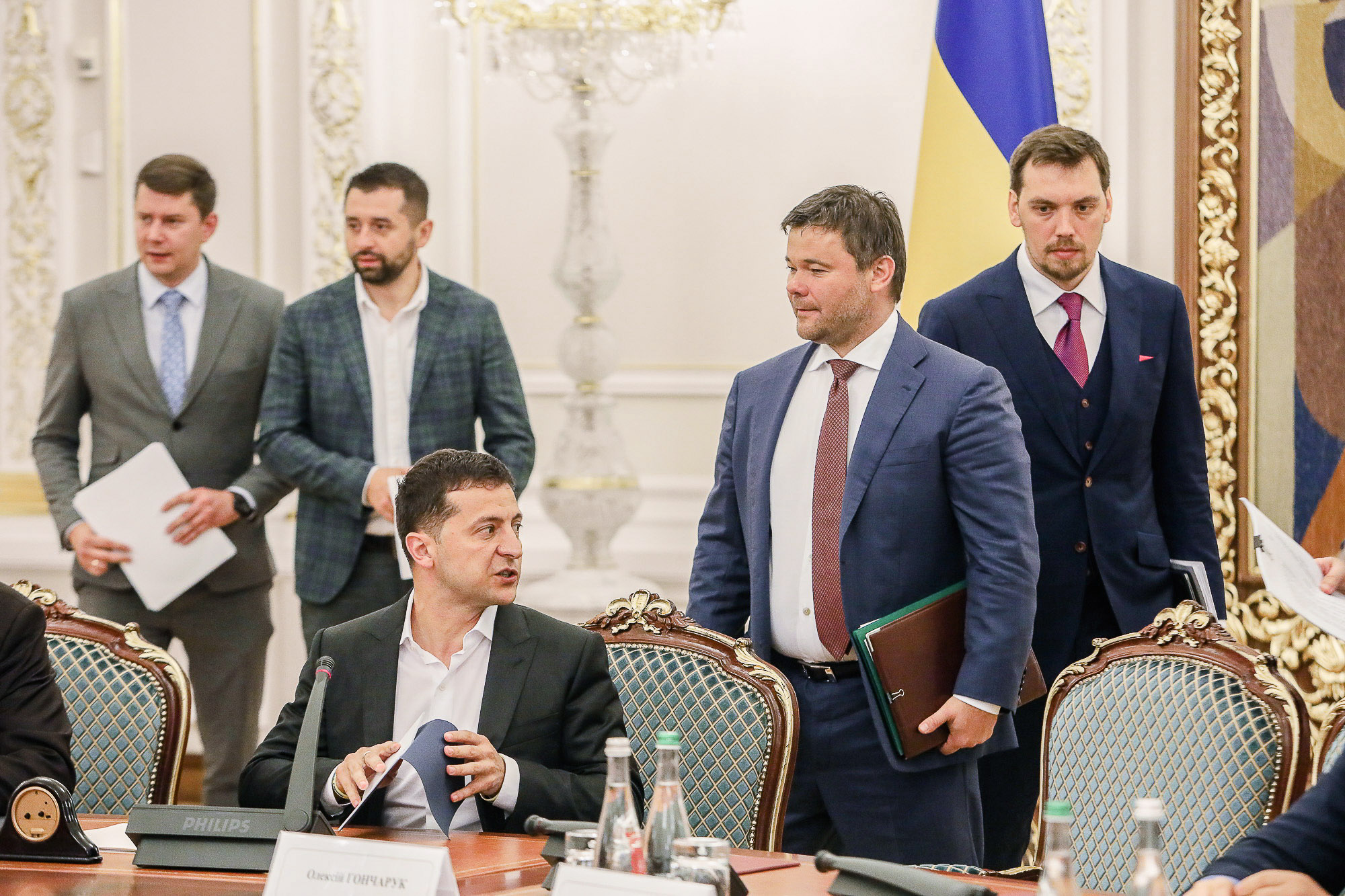See a related story here.
Fighting corruption in Ukraine is a dirty job, but it’s got to be done.
JOIN US ON TELEGRAM
Follow our coverage of the war on the @Kyivpost_official.
“For 27 years, this country had been going deeper and deeper into a swamp,” Andriy Bohdan, President Volodymyr Zelensky’s chief of staff, told the Kyiv Post in an Oct. 30 interview. “It’s very hard to clean up a swamp and keep your shirt white.”
In this clean-up operation that he is leading, Bohdan is a reluctant public servant. He says he would much prefer returning to his private law practice, where he served rich clients that included billionaire oligarch Ihor Kolomoisky, and where he raked in millions of dollars in fees. As a private citizen, he also didn’t have to put up constantly with “corrupt journalists who spill dirt” on him.
But his nation and his president have called him back into public service for the first time since the EuroMaidan Revolution sent Kremlin-backed President Viktor Yanukovych and Prime Minister Mykola Azarov fleeing to Russia in 2014.
“I’m not making any money here. We’re not taking any bribes. No tapping into financial flows, no (stealing from) state enterprises, no corruption. Our team isn’t making money here,” Bohdan said of the Zelensky administration’s moral principles. “We’re building an honest state. We recruit and appoint honest people. We choose the best people who become ministers, deputy ministers, lawmakers. We will be here as long as we can be doing reforms. And when we can’t do it anymore, we will leave immediately and pass on the key from this place.”
And now, he says, he’s battling some of his former clients who don’t want to give up their privileges and monopolies that they have used to siphon money from Ukrainians.
“The problem is that I want to quit but I can’t — the president won’t let me yet. I was making huge money.
I lived a free life,” Bohdan said. “Here I sit from dusk ‘till dawn, and fight many wars, including with my former clients, of whom I have many. And I don’t feel comfortable.”
Amidst his grievances and burdens, however, Bohdan explained why he soldiers on.
“My children live and study in Ukraine. I don’t have real estate abroad, except for an apartment in Slovakia,” Bohdan said. “All my money is here, and my business is here. I want to live in Ukraine and for Ukraine to be a normal country. This is all I need.”
Simple: Borrow cheaply
When asked what his major goal is at the job, Bohdan takes out a notepad and starts writing numbers.
“It’s pure math,” Bohdan said. He aims to pass legislation that will improve the confidence of everyone, including international partners, in the economic and political situation. Then, he said, Ukraine can borrow at the historically low interest rates that Western countries now enjoy.
“In January, we took loans at 9.5% interest rate. Today’s it’s already 6%. My goal is to make it go down at least to 3%,” he said, drawing a large “3” in the notepad and circling it.
This will allow, he said, multibillion-dollar investments so that Ukraine “can build roads, airports, schools.” This, in turn, will lift gross domestic product, wages, pensions, industry, and so on.
“To achieve it, we need to pass relevant legislation, get positive reviews from rating agencies and from the International Monetary Fund,” he said. “It’s a list of laws, a list of reforms. Everything is leading to this.
To pass all the laws and not reach this result — 3% — means to not succeed. This is the goal I and our team have, this result.”
Complex: oligarchs
The steps needed for cheap lending, however, require legislation to fight corruption, break up monopolies and end oligarchic privileges while establishing rule of law.
Here’s where it gets difficult.
When asked how he plans to de-oligarchize and de-monopolize Ukraine’s economy, he threw the question back at the Kyiv Post.
The interviewers noted that possible paths include not allowing exiled billionaire Dmytro Firtash to use subsidized natural gas from Naftogaz without paying for it while racking up $2 billion in debts as his companies enjoy a monopoly on gas distribution. Solutions also include not allowing Kolomoisky, Bohdan’s former client, to rack up a nearly $2 billion tax debt to the state through Ukrnafta, the state oil producer. And the answer might lie in not allowing the richest of the oligarchs, Rinat Akhmetov, to monopolize the electricity sector.
“Maybe, Bohdan said, but the solution is complicated.”
“What do you imagine we should do? Firtash owns these ‘oblgazes’ (regional gas distribution companies). This is a given, this was the situation when we came here. He owns 70% of ‘oblgazes.’ So should we nationalize them? But what will investors say? About us taking away his private property? And how are we supposed to be distributing gas? We can’t be giving gas to people in bottles. This is the system that exists. I know for sure that our guys will be trying to change it.”
He agreed that these monopolies need to be broken up.
“We need to change the legislation on monopolies because the current one is very forgiving. We needed to reboot the anti-monopoly committee, which we did. But to really implement de-monopolization — it’s complicated,” Bohdan said. “This isn’t America, where everything is clear and rules have been there for a long time. Here, no one ever did it. How do you de-monopolize the production of electric energy? There are a lot of questions. It’s a process. It’s not easy. But we will 100% follow this path. We don’t have a choice. If we don’t follow this path, nothing will change.”
Oligarchs losing power…
The beauty of the Zelensky phenomenon, Bohdan said, is that he accumulated so much power that it weakened the oligarchs’ grip over parliament, and they can’t twist the president’s arm to get favors.
The president’s Servant of the People party has 254 seats in parliament, with 226 votes required to pass legislation. Even with the recent unrest inside the faction, where several of the members associated with Kolomoisky were opposing some of the legislation the government was passing, the faction still has enough votes to pass laws without concessions to the oligarchs.
“Today, we don’t depend on any of the oligarchs,” Bohdan said. “Here’s how it always worked (before Zelensky): I put a discount on iron ore mining fees into the state budget, and you give me 30 lawmakers who vote for the state budget. Thankfully, we don’t need the oligarchs’ lawmakers. We can pass all the laws on our own. But if we lose support, (the oligarchs) will start to buy out our lawmakers. And when we don’t have the 226 votes, when the oligarchs start to chip them off, then we will need to start trading the interests of the country in exchange for votes.”
…but ‘want to dictate’
This new set of circumstances, Bohdan said, has made the oligarchs unhappy.
Besides Kolomoisky, he and Zelensky also met with Akhmetov and Victor Pinchuk.
Akhmetov, for instance, has been clashing with the government over recent changes in energy legislation that introduced a free market on electricity for industrial consumers and allowed importing electricity from Belarus and Russia. The new measures put downward pressure on the energy prices, hurting the energy monopoly of Akhmetov’s companies.
In mid-October, the Anti-Monopoly Committee of Ukraine started an investigation into one of Akhmetov’s energy companies for alleged attempts to sabotage the new energy market.
Is Akhmetov pressuring Zelensky’s administration for favors? If he tries, the administration is ready to fend off his attacks, Bohdan said.
“If (Akhmetov) starts threatening us or trashing us (on his TV station), we have legal instruments to make it much worse for his business,” Bohdan said. “But we will never hurt business, because it’s GDP.
We, as the authorities, don’t influence the business as long as the business doesn’t put illegal influence on the authorities. You don’t influence the process of making decisions, and we don’t make decisions that influence the business. The market will regulate itself. Monopolies need to be divided, that is for sure.
But from that point on, it’s all up to the market, not to the state.”
Equal rules are not how the oligarchy is used to doing business in Ukraine.
“They’re all unhappy about it. They all want monopolies, preferences, influence. All of them want to be able to dictate conditions for authorities,” Bohdan said. “But now they don’t.”
Timid officials
Bohdan said he’s trying to instill private sector values into the public sector. Chief among them: get results.
“There are two types of lawyers: Those who work for a ‘success fee’ and get paid when they deliver the result, and those who have billable hours. I’m a ‘success fee’ person. And I’m trying to recruit people like that for public offices. People who are result-oriented,” Bohdan said.
But it’s not easy.
“It’s hard to find people. Do you know how hard it is to find 254 lawmakers? Do you have 254 friends you can trust? And they are offered big money. They have big temptations,” he said. “Do you know how hard it is to hire a minister who is paid $2,000 a month but with one signature he moves around billions?”
But they are managing to build independent government institutions.
“You don’t understand what is going on. In this country — and in the world — there has never been a Cabinet where there is not a single representative of a political party, even ours. There are people in the Cabinet whom we met for the first time on the day before the parliament was supposed to vote for them.
They came from a professional, expert environment,” Bohdan said. “There is not a single relative of ours. There is not a single representative of oligarchs — not of Kolomoisky, not of Akhmetov, not of Pinchuk.
Not a single one. There are no lobbyists of some big industrial groups. They are all good. Will they be effective? We will see. We don’t have anything else. There is a lot of good, honest guys, experts. They came to change the country. So far, they believe they can do it. When they stop believing, everything will return to what we had.”
The weaknesses of today’s inexperienced public servants and elected officials, he said, is fear of mistakes and indecisiveness. This is where he tries to step in.
“They’re afraid of making decisions. They are new. There are no experienced politicians, no people with thick skin,” he said. “I have thick skin. And I’m moving forward, and I’m persuading them that they should be doing the right thing and not be afraid of criticism…”
Bohdan said that he encourages new officials to violate procedural norms to get quick results but they’re reluctant to do so.
“Our ministers, they’re young. They are used to being loved. And now they need to leave their comfort zone and make decisions. They’re afraid. Sometimes you need to give them confidence, to tell them — guys, don’t be afraid. If you don’t do anything, there will be negative reaction for sure. If you do something, the negative reaction will turn into positive with time. And you will be loved again.”
Poroshenko worse
Bohdan has a long, and mostly combative, history with ex-President Petro Poroshenko. He said they met during the 2004 Orange Revolution that brought Viktor Yushchenko to power. He also got elected on the Poroshenko party list in the 2014 parliamentary election but got into a conflict with Poroshenko and was ultimately excluded from taking his seat after a protracted battle.
Of Poroshenko’s five years in office, Bohdan said: “He blew the country’s chances. The little that he did in those five years was the result of the pressure of the international community and civil society and IMF.”
He doesn’t heap the same scorn on Yanukovych and Azarov, in whose government he served as the head of a key anti-corruption unit in the Ministry of Justice. While leading an anti-corruption unit in the spectacularly corrupt Yanukovych-Azarov administration sounds like an oxymoron, Bohdan said he had his successes. It was there that he worked with the current Prosecutor General, Ruslan Ryaboshapka.
“I achieved a lot. We destroyed a corrupt scheme in the Ministry of Justice that abused the state registries. It was a crazy stupid scheme. When any notary, any official doing any service — registering the birth of baby, for instance — there was a state fee. The fee was going through a state enterprise that was paying a royalty for using software to offshore companies in Cyprus. We demolished this scheme. We made the state fee stay in the state budget. It was a huge amount of money. For this, they added me to the lustration law. I always reference this example — when you do something good and get punished for it,” he said.
Today, he said, “if you worked in Poroshenko’s administration it is a much bigger stain than if you worked with Azarov,” adding that Azarov didn’t reach out to him to discuss the possibility of returning to Ukraine from Russia, where he has resided since 2014.
Troublesome mayors
Zelensky’s team, including Bohdan, haven’t shied away from criticizing Kyiv Mayor Vitali Klitschko and Dnipro Mayor Borys Filatov for their shortcomings. But they’ve been reluctant to publicly take on Kharkiv Mayor Gennady Kernes and Odesa Mayor Gennady Trukhanov, both of whom face accusations of serious corruption and running their cities — the second and third largest in Ukraine, respectively — as fiefdoms.
Bohdan insists it’s not due to some under-the-table agreements with them.
“Do you want the president to lead a war simultaneously with all oligarchs, all mayors, all businessmen, all agricultural businessmen, all separatists and the whole international community? Should we start wars with everyone and lose all these wars together? We have so many problems here that the president can’t be dealing with the mayor of Odesa now.”
You can also highlight the text and press Ctrl + Enter






